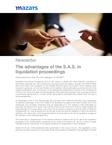
The advantages of the S.A.S. in liquidation proceedings
Simplified Joint Stock Companies (S.A.S.) are, without a doubt, the most important innovation in Colombian corporate law. As it is about to be ten years since its creation, through Law 1258 of 2008, there have been many analyses on the benefits that this figure has brought. Such analyses have focused, in particular, on the real limitation of the liability of the shareholders up to the amount of the capital contributed in such companies, on the operational simplification involved in the management of the S.A.S. and on the legal recontextualization that implies being able to have a company without a partnership agreement, or, in other words, being able to associate with oneself when one has a sole proprietorship.
An advantage of the S.A.S. that perhaps has not been much explored, but which has a significant competitive advantage, is the one related to its liquidation procedure and what it entails due to the references and normative remissions that are applicable to it. The analysis of this advantage is, precisely, the object of this study, which will try to prove that in the S.A.S. that are supervised by the Superintendence of Corporations, and where the provisions of article 6 of Decree 2300 of 2008 are complied with (i.e. that its assets are not enough to pay the external liabilities or that it has pension liabilities), the intervention of the Superintendence of Corporations will not be mandatory to approve the inventory of the corporate patrimony.
This conclusion is reached due to the express reference made by the S.A.S. law to the liquidation procedure of the limited liability companies of the Code of Commerce (C. de Co.), where it clearly indicates that the intervention of the Superintendence of Corporations is not mandatory.
Article 36 of Law 1258 establishes that, specifically in the case of S.A.S., "the liquidation of the patrimony shall be carried out in accordance with the procedure indicated for the liquidation of limited liability companies". In turn, Article 237 of the Code of Commerce indicates that "in companies with quotas or shares of interest, the intervention of the Superintendent in [the approval] of the inventory shall not be mandatory", while Article 233 of the same statute is clear in establishing that "in joint stock companies, the liquidators must, within the month following the date on which the company is dissolved with respect to the partners and third parties, request the Superintendent of Companies for the approval of the inventory of the corporate assets".
When reviewing the text of Decree 2300 of 2008 (which regulates the approval of the inventory of corporate assets), it is clear that it only applies to stock companies, since when regulating, in Article 6, the two causes for which the inventory must be submitted for approval of the Superintendence (that its assets are not sufficient to pay the external liabilities or that it has pension liabilities) it refers to the fact that only "stock corporations and branches of foreign companies supervised or controlled by the Superintendence of Corporations" must do so.
Thus, although the S.A.S. is clearly a joint stock company, it is not for the liquidation process, since by express provision of Article 36 of Law 1258/2008 (mandatory law) its treatment, solely for the purposes of this process, is that of a limited liability company and, referring to the Code of Commerce (specifically to Article 237 of such statute), it is indicated therein that for such companies (those of quotas or interest shares) the process of approval of the inventory by the Superintendence of Corporations is not mandatory.
This advantage alone makes the transformation of other types of joint stock companies to S.A.S. convenient, when compliance with the requirements established in Article 6 of Decree 2300 of 2008 is evidenced, because in practice, since it is not necessary to submit the approval of the corporate assets to the Superintendence for consideration, this can lead to a significant saving of time in the liquidation process.


